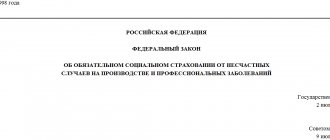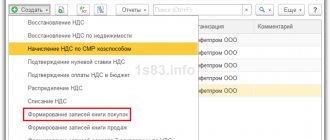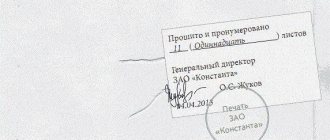Small businesses in Russia enjoy special benefits intended only for them. The state is trying to reduce the tax and administrative burden of small businesses, receiving in return an increase in employment and a decrease in social tension. What does the definition of “small businesses” mean and who belongs to them in 2021?
A small business entity is a Russian commercial organization or individual entrepreneur that aims to make a profit. Also included in this category are:
- peasant (farm) farms;
- production and agricultural cooperatives;
- business partnerships.
A non-profit organization, as well as a unitary municipal or state institution is not a small business entity.
Create business registration documents for free
Who belongs to small businesses
According to Art. 4 of the Law “On the Development of Entrepreneurship in the Russian Federation” dated July 24, 2007 No. 209-FZ, various economic entities are classified as SMBs (small businesses), namely:
- individual entrepreneurs;
- peasant (farm) farms;
- business societies;
- business partnerships;
- consumer cooperatives;
- production cooperatives.
All of them must comply with the main and additional criteria for small businesses outlined in law 209-FZ. These relate to the fundamental characteristics of the management of any company, namely: the number of employees, income received and the composition of the authorized capital. On their basis, it is determined whether the organization can be considered small or whether it must be classified among other categories of economic entities. Let us consider what criteria characterize a small enterprise in more detail.
Important! Recommendation from ConsultantPlus All SMEs are included in a special register on the Federal Tax Service website. If you do not find your SME there, submit a request to check the registry information. For more details, see K+. Trial access is available for free.
Small business audits
A separate type of benefits for small businesses is the restriction of control activities on the part of government agencies. If the company is included in the SME register, then inspectors must comply with established standards for the duration of the inspection. For example, for a micro-enterprise, the duration of control by one department should not exceed 15 hours per year. For medium-sized businesses - no more than 50 hours per year.
In addition, officials introduced special supervisory holidays. These are two years during which small businesses are exempt from audits and on-site inspections (Federal Law No. 480-FZ dated December 25, 2018). Please note that supervisory holidays are not a complete release from supervision. Some types of checks cannot be avoided. For example, inspections by the Ministry of Emergency Situations, Rosalkogolregulirovanie and other departments.
In addition, enterprises conducting activities that require compulsory licensing are entitled to supervisory holidays. For example, banks, private security companies, insurers and pharmacists are exempt from a significant part of the audits.
Basic and additional criteria indicating small enterprises
The first criterion that you need to focus on is the income received over the past calendar year from all types of activities. The maximum value of this criterion is 800 million rubles.
In addition to the profitability parameter, the main criteria include the average number of personnel for the past calendar year. For small enterprises this characteristic ranges from 16–100 people. The average headcount is calculated based on a certain rule, namely:
- First, the average number of full-time employees is calculated.
- After this, the average number of part-time personnel is determined.
As for additional criteria, these include the total percentage of membership of other economic entities in the authorized capital of the entity. Firstly, for business partnerships or companies, this indicator should have no more than 25% of the total participation of the Russian Federation, constituent entities of the Russian Federation or municipalities, public organizations or charitable foundations. Secondly, the management company must have no more than 49% of the participation share of other legal entities (not considered SMEs) or foreign companies. That is, at least 51% of the authorized capital must belong to individuals or small and medium-sized businesses.
Legal entities whose activities are related to intellectual developments in various fields, for example, the creation of information databases, industrial designs, etc., may also meet the criteria for a small enterprise.
In relation to joint stock companies, they can also have the status of a small organization, only in this situation their shares must belong to the innovative sector of the state economy.
No need to confirm status
The organization does not need to be separately registered and receive confirmation that your company is an SME. The status is also saved automatically in the future. It is enough that the company or entrepreneur meets the listed conditions. Moreover, even if within one or two years you exceed the established limits, the status of the enterprise will remain. A change in status occurs only when the maximum indicators for the number of employees, the amount of income or shares in capital are not observed for three consecutive calendar years (Part 4 of Article 4 of Federal Law No. 209).
Does the company belong to the SMP (step-by-step table for determining the status of the company)
Let's look at the algorithm for determining a company's category step by step.
| Step | Algorithm |
| 1. Determine the average number of personnel for the past calendar year | Calculated by calculation. Information for calculation is taken from information submitted to the tax office. For small businesses the figure ranges from 16 to 100 people |
| 2. We calculate the income acquired over the past calendar year from all types of activities | The information is taken from the previous year's tax return. When combining modes, income is summed up for each declaration. For small enterprises, the value should not exceed 800 million rubles. |
| 3. We determine the percentage of membership of other companies in the authorized capital of the company | 1. The percentage of membership of the state, constituent entities of the Russian Federation, municipalities, public organizations or charitable foundations is no more than 25%. 2. The percentage of membership of foreign legal entities or Russian legal entities (not having the status of a small enterprise) is no more than 49% |
Revenue and headcount
The parameters that are considered to determine the size of the taxpayer are its annual income and the average number of employees for the previous year. To belong to one or another category of SME, the entity must meet both conditions: both in terms of income and the number of employees.
So, the 2021 criteria for classifying an entity as a small/medium business are as follows:
- if the annual income is up to 120 million rubles, and the average number of employees does not exceed 15 people, then this is a micro-enterprise;
- if the annual income is up to 800 million rubles, and the average number of employees is no more than 100 people, it is a small enterprise;
- if the annual income is up to 2 billion rubles, and the average headcount is no more than 250 people, it is a medium-sized enterprise.
Features of classifying individual entrepreneurs
Speaking about small and medium-sized businesses and their criteria in 2021, individual entrepreneurs should be mentioned separately.
We noted above that individual entrepreneurs, farms and cooperatives are assessed solely by income and number of employees. But as for individual entrepreneurs, there are nuances:
- in the absence of hired personnel, only the income of the entrepreneur is taken into account;
- Individual entrepreneurs on the patent are classified as micro-enterprises (their number of employees cannot exceed 15 people, and they do not take into account the amount of revenue).
The nuances of small and medium-sized businesses
If a small enterprise meets the 2021-2021 criteria, it is entered into a special register of small and medium-sized businesses. In this case, the organization is not required to submit any special information to the tax authorities or take other actions - it is automatically classified as a small business. Federal Tax Service employees classify companies as small based on the information they provide in the usual manner, which includes:
- average number of employees;
- data from the Unified State Register of Legal Entities or Unified State Register of Individual Entrepreneurs;
- tax returns.
Read about how the SME register is maintained and when it is updated in ConsultantPlus. Trial access to the system can be obtained for free.
It should be noted that enterprises with small status receive the right to use certain benefits in the field of accounting. These include the following points:
- The right not to set a limit on the cash balance in the cash register. If it was installed earlier, management can issue an order to cancel it.
- Possibility of conducting simplified accounting.
- Preferential conditions for special taxation, which are established at the regional level.
- Reduction of inspection period by state regulatory authorities - for small enterprises it is 50 hours per year.
- Some categories of individual entrepreneurs receive tax holidays, which must be specified in the regulatory legal acts of the region.
The following materials will help you understand the nuances of simplified accounting and reporting in small enterprises:
- “Features of accounting in small enterprises”;
- “Simplified accounting reporting for small businesses for 2021.”
Benefits for small businesses
Let's consider the main concessions and benefits that are provided to small and medium-sized businesses.
Accounting and reporting
A significant part of the benefits relates to accounting. Thus, almost all small enterprises (except for those that are subject to mandatory audit, microfinance organizations, housing cooperatives and other entities named in paragraph 5 of Article Federal Law No. 402-FZ dated 06.12.11 on accounting) can conduct simplified accounting and submit simplified financial statements. In most cases, it consists of only two forms (balance sheet and income statement). Some organizations (NPOs and recipients of budget funds) must also fill out a report on the intended use of funds.
When maintaining simplified accounting, a number of concessions are provided (information of the Ministry of Finance No. PZ-3/2015). Let's list the most important ones. So, you don’t have to create a reserve for vacation pay; charge depreciation not monthly, but less often (including once a year); write off one-time expenses for the acquisition of inventories for management needs (and for micro-enterprises - any inventories). Also, with this accounting method, any errors in accounting can be corrected as insignificant, even if they are identified after the statements are approved; do not apply PBU 18/02 “Accounting for corporate income tax calculations” and PBU 2/2008 “Accounting for construction contracts”; not to revalue fixed assets and intangible assets and not to reflect the impairment of intangible assets; do not revaluate financial investments and do not check them for impairment; and also account for interest on any loans, including those received for the purchase of investment assets, as other expenses.
IMPORTANT. The head of the organization can conduct simplified accounting directly. To do this, he needs to issue an appropriate order (clause 3 of Art. Law on Accounting).
In addition, a small enterprise may decide to use the cash method for accounting purposes (clause 20 of the Standard Recommendations for organizing accounting for small businesses, approved by Order of the Ministry of Finance dated December 21, 1998 No. 64n).
REFERENCE. Individual entrepreneurs, in principle, are not required to keep accounting records and prepare accounting records, even in a simplified form (subclause 1, clause 2, article of the Accounting Law).
Get a free sample accounting policy and do accounting in a web service for small LLCs and individual entrepreneurs
Cash transactions
Directive of the Bank of Russia dated March 11, 2014 No. 3210-U established a simplified procedure for conducting cash transactions for small enterprises. It involves exempting such organizations and individual entrepreneurs from the need to approve a cash balance limit.
REFERENCE. Based on the same instructions of the Central Bank of the Russian Federation, individual entrepreneurs have additional “cash” benefits - they do not have to issue cash receipts and expenditures and do not keep a cash book.
Also see “Cash operations: how a small company can organize cash accounting” and “Cash discipline for individual entrepreneurs: how an entrepreneur can work with cash.”
Tax benefits
As for tax preferences for small and medium-sized enterprises, today they are established exclusively at the regional and local levels. It is possible to introduce benefits for the payment of regional and local taxes (property tax, land and transport taxes), as well as preferential rates for income tax (in the part credited to the regional budget), UTII and a single tax within the simplified tax system.
Labor Relations
Small businesses that employ no more than 35 (in the field of retail trade and consumer services - no more than 20) people can enter into fixed-term employment contracts with them (Article of the Labor Code of the Russian Federation). There is no need to re-register these contracts as open-ended if the employer loses its SME status, or if the specified number of employees is exceeded. In the latter case, contracts for an indefinite period should be concluded with new employees (36th (21st) and subsequent ones).
ATTENTION. Micro-enterprises have the right not to draw up internal labor regulations, regulations on wages, regulations on bonuses and other local regulations, as well as a shift schedule. The conditions that are usually prescribed in these documents must be included directly in the employment contract. To do this, it is better to use a special standard form of agreement (Resolution of the Government of the Russian Federation dated August 27, 2016 No. 858).
Draw up and print an employment contract for free
Administrative checks and responsibilities
A ban on conducting scheduled administrative inspections has been introduced for small and medium-sized businesses. The moratorium will be in effect until the end of 2021 (Federal Law dated December 25, 2018 No. 480-FZ).
ATTENTION. The moratorium does not apply to control activities that are carried out using the so-called risk-based approach (in particular, we are talking about inspections carried out by fire departments or labor inspectors). There are other exceptions. For more details, see “The moratorium on certain scheduled non-tax audits of small businesses has been extended.”
Find an organization or individual entrepreneur in the list of scheduled non-tax audits for free
In terms of administrative liability, a privilege has been established for SMEs, obliging controllers to replace almost any administrative fine with a warning.
The benefit is valid if the violation was committed for the first time and it did not cause property damage, as well as harm (or the threat of causing it) to human life and health, objects of flora and fauna, the environment, historical and cultural monuments, state security, and there was no threats of emergencies of a natural and man-made nature (clause 1 of article 4.1.1 of the Code of Administrative Offenses of the Russian Federation). The types of offenses for which it is impossible to replace a fine with a warning are listed in paragraph 2 of Article 4.1.1 of the Code of Administrative Offenses of the Russian Federation.
Deposit insurance
Since 2021, accounts and deposits of micro-enterprises and small enterprises have been included in the compulsory insurance system (clause 2 of article 9 of the Federal Law of December 23, 2003 No. 177-FZ). If the bank in which the money of such a company or individual entrepreneur is located loses its license, or the Central Bank imposes a moratorium on satisfying the claims of creditors of this bank, it will be possible to receive insurance compensation. Its size is equal to the amount that was in the accounts, but not more than 1,400,000 rubles. across all accounts in one bank. For more details, see “Money in a “problem” bank: when and how individual entrepreneurs, small businesses and individuals will be able to return money from accounts and deposits.”
Statistical reporting
For small and medium-sized businesses, the number of forms submitted to statistical authorities has been significantly reduced. In particular, they do not submit Information on underemployment and movement of workers, Information on overdue wages, Information on the volume of paid services to the population by type, and many others.
REFERENCE. Some forms of statistical reporting are designed specifically for SMEs. For example, No. 1-IP “Information on the activities of an individual entrepreneur”, No. PM “Information on the main indicators of the activities of a small enterprise” and others. But SMEs do not submit form No. P˗5(m) “Basic information about the organization’s activities,” although it is a common misconception that this form is almost the main statistical report for small organizations. For more details, see “Rosstat has updated 17 reporting forms on the activities of organizations and individual entrepreneurs”, “Rosstat has updated 16 reporting forms”, “Reporting to Rosstat: information about employees and wages will need to be submitted using updated forms” and “Rosstat has approved new instructions for filling out forms."
Fill out and submit any of the listed forms online
Government order
Companies and individual entrepreneurs that have received the status of small and medium-sized businesses can participate in government procurement under special conditions. Special tenders are held for them. The amount of bid security for small and medium-sized enterprises is lower, and the contract payment period is shorter than for “regular” procurement participants. Sellers who are SMEs with a good reputation may not enforce the contract at all. For more details, see “Government procurement under 44-FZ: what small businesses must take into account when participating in tenders from July 2021.”
Receive notifications about tenders for small and medium businesses
When a small enterprise turns into a medium or large one
There are certain circumstances, the occurrence of which will lead to the organization losing its status as a small enterprise. Naturally, this is due to the fact that it will not fall under the criteria of small enterprises in 2020-2021. These conditions include the following:
- If circumstances are associated with an increase in the percentage of participation in the authorized capital above the limit value, then the enterprise will lose its small business status. In this case, the moment of transition to a medium or large enterprise is considered to be the date of making an entry in the Unified State Register of Legal Entities about the change in the authorized capital of the organization.
- If circumstances are associated with an increase in the average number of personnel or income from all types of entrepreneurial activities above the legal limit, the status of a small enterprise is retained by the enterprise for three years. After the expiration of the mentioned period, the small enterprise will lose this status and become medium or large, depending on the value of these criteria, as indicated in paragraph 4 of Art. 4 of Law 209-FZ.
What information about SMEs is contained in the register in the public domain?
To obtain information about a legal entity or individual entrepreneur, you must enter the TIN, OGRN or OGRNIP, name of the organization or full name of the individual entrepreneur in the “search” line. It is also possible to search using the TIN list.
The following information will appear, which can be downloaded in Excel format if desired:
- name of the legal entity or full name of the individual entrepreneur;
- subject category (micro, small or medium enterprise);
- TIN;
- location of the legal entity or place of residence of the individual entrepreneur;
- main activity;
- date of entry of information into the register;
- a note indicating whether the subject is a newly created legal entity or a newly registered individual entrepreneur;
- availability of concluded agreements and contracts;
- information on the production of innovative, high-tech products;
- participation in partnership programs;
- information about received licenses.
Online accounting for a new business: calculate salaries, taxes and insurance premiums in one window
Details
Results
To be classified as a small enterprise, a company must meet the criteria specified in Law 209-FZ. These include the average number of personnel, income from all types of activities and participation in the authorized capital. If all conditions meet the required values, the company automatically receives small status and is entered by the tax authorities into a special register of small and medium-sized businesses in Russia.
Sources: Law “On the Development of Entrepreneurship in the Russian Federation” dated July 24, 2007 No. 209-FZ
You can find more complete information on the topic in ConsultantPlus. Free trial access to the system for 2 days.
Features of 2021
In 2021, there was a crisis associated with the spread of coronavirus infection. To ensure that small and medium-sized businesses can survive it with fewer losses, the state has introduced additional support measures for those operating in the most affected industries. In particular, they were provided with subsidies for the payment of salaries to employees, preferential loans, deferment of taxes, insurance premium rates were reduced (for all SMEs) and certain mandatory payments were cancelled.
At the same time, most of the benefits provided are aimed specifically at small and medium-sized businesses or micro-enterprises. In other words, if a company is not included in the SME register, then it can no longer count on receiving government support.
In order for more organizations and entrepreneurs to take advantage of these measures, in 2021 it was decided to change the rules for creating the register. In particular, the deadline for filing reports for 2021 has been increased. As a result, business entities (subject to meeting the criteria) that submitted reports for 2021 by June 30, 2021 were classified as SMEs.
List of advantages of classifying a company as an SME:
- Supervisory 3-year vacation - SMEs should not be subject to scheduled general type inspections by government agencies. But such a relaxation only applies if the company has not been involved in various offenses during the specified period.
- Lack of cash limit - SME firms have the right to operate without the manager’s approval of the cash limit in the cash register. If desired, companies can work with a limit.
- Simplified accounting – the simplified accounting methodology also includes the preparation of simplified financial statements.
- Regional tax incentives – authorities in most regions provide reduced rates for SMEs. For example, this applies to property tax calculated from the cadastral value. The nuances of taxation are specified in the regulations of the constituent entities of the Russian Federation.
SONO
SONO stands for socially oriented non-profit organization. The definition of a non-profit organization, including its subtype of a socially oriented institution, is given in Federal Law No. 7 of January 12, 1996 “On Non-Profit Organizations”.
According to the legal act, namely Article 2, a non-profit organization as a whole is a legal entity that does not include profit as the main purpose of its activities . That is, the company does not work for the sake of income, although it can carry out entrepreneurial activities (in accordance with Part 2 of Article 24).
A socially oriented organization is aimed at solving social issues and is designed to develop the country's civil society.
SONO does not include political parties, state-owned companies and corporations.










